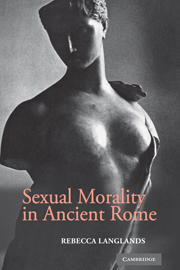Book contents
- Frontmatter
- Contents
- Acknowledgements
- Introduction
- Chapter 1 Sexual virtue on display I: the cults of pudicitia and honours for women
- Chapter 2 Traditional narratives and Livy's Roman history
- Chapter 3 Valerius Maximus: the complexities of past as paradigm
- Chapter 4 Subversive genres: testing the limits of pudicitia
- Chapter 5 Declamation: what part of ‘no’ do you understand?
- Chapter 6 Sexual virtue on display II: oratory and the speeches of Cicero
- Chapter 7 Imperial narratives, imperial interventions
- Conclusion
- Bibliography
- Subject index
- Index locorum
Introduction
Published online by Cambridge University Press: 22 September 2009
- Frontmatter
- Contents
- Acknowledgements
- Introduction
- Chapter 1 Sexual virtue on display I: the cults of pudicitia and honours for women
- Chapter 2 Traditional narratives and Livy's Roman history
- Chapter 3 Valerius Maximus: the complexities of past as paradigm
- Chapter 4 Subversive genres: testing the limits of pudicitia
- Chapter 5 Declamation: what part of ‘no’ do you understand?
- Chapter 6 Sexual virtue on display II: oratory and the speeches of Cicero
- Chapter 7 Imperial narratives, imperial interventions
- Conclusion
- Bibliography
- Subject index
- Index locorum
Summary
doce me, quid sit pudicitia et quantum in ea bonum, in corpore an in animo posita sit
Teach me what pudicitia is, and how good it is, and whether it is located in the body or in the soul.
(Seneca, Letters to Lucilius 88.8)Sexual behaviour was a central ethical concern of Roman authors, whatever Foucault may have suggested. The ethical problems of sex are treated at length, for instance, by two (rather different) didactic works of the late Republic, Lucretius' De rerum natura and Virgil's Georgics, both of which depict amor as a wild and destructive force. For the early imperial moralist Valerius Maximus, libido (or lust) is one of the most dangerous vices, and he devotes one of his longest chapters (6.1) to the subject of sexual crime and sexual virtue (pudicitia). Granted there was no Latin term corresponding to the English word ‘sexual’: a cluster of terms such as venus, amor, voluptas, with their own semantic ramifications, referred to the phenomenon of sex. Neither was there a Latin word to convey our abstract notion of ‘morality’, although this English term is derived from the Latin mores which signifies both behaviour and codes of behaviour – custom or convention and then more generally ways of behaving, moral conduct, morality.
Information
- Type
- Chapter
- Information
- Sexual Morality in Ancient Rome , pp. 1 - 36Publisher: Cambridge University PressPrint publication year: 2006
